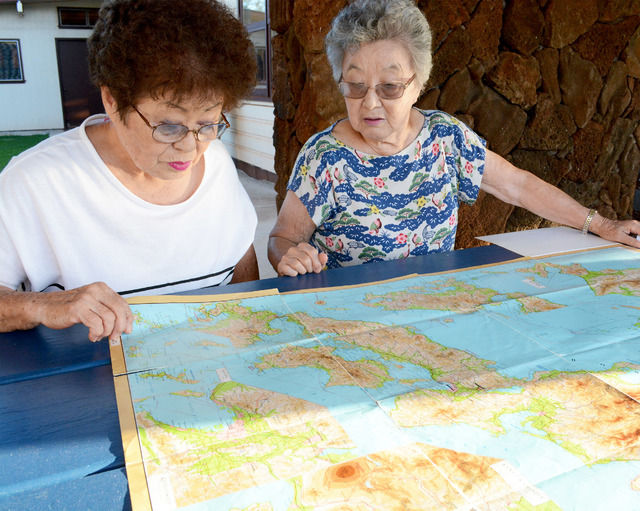Editor’s note: This is the ninth in a series of stories by The Garden Island marking the 70th anniversary of the surrender of Japan on Aug. 15, 1945, and the end of World War II.
In the mountains north of the harbor on Okinawa, Lois Kobashigawa’s family had a shelter.
They left their home in a town whose name Kobashigawa no longer remembers before the United States military bombarded it during the final days of World War II in 1945.
The land at the southern end of the island chain nation was vulnerable. Battleships were on the horizon. Bombs fell. Families sent their kids away — to Tokyo, to the north, to get them to safety.
More bombs fell.
Kobashigawa’s family, her parents and two siblings, hid during the worst of it.
Days later, when they came back down from the shelter, the city was a wasteland.
“No more, nothing,” said Kobashigawa, who now lives in Kekaha, waving her arms along a flat plane. “Nothing.”
The family turned around and caught a ride from a community wagon back up into the mountains. Troops were coming and they needed to hide again. Looking back, she has no idea how they hitched a ride — who would stop for strangers as the U.S. Army and Marine Corps invaded Okinawa behind them with the beginning flood of 185,000 troops?
People helped each other. That’s the only possible answer, really, she said.
Her father carried a pot of rice and a pot for water as they trekked up the mountain.
“Each time running away, more deep inside the mountain,” Kobashigawa said.
They didn’t know what would happen if they were caught. What would the Americans do? Kobashigawa had never seen one. At night, her father cooked a cup of rice for each person. They cooked at night so smoke wouldn’t reveal their location during the day.
“It looked like water,” Kobashigawa said of the thin, undercooked rice. “No more nothing for eating.”
They foraged for potatoes and vegetables in the mountains. There wasn’t a road to follow, and she remembers her father climbing a tree to see if he could spot the trail of other Japanese fleeing before them. By the time the war was over, a third of the civilian population were killed on Okinawa, and a quarter of the civilian population were killed during the 1945 Battle of Okinawa alone.
“Up, up, up,” she said of their trek into the mountain.
At times, Kobashigawa could hear the sound of heavy machinery rumble in the distance and some nights the Americans would light up the forest with flares, creating violent search lights above the peaks.
The family finally came upon a deserted house. They lived there until the end of the war, foraging, cooking what they could find. They had no idea the war was over. And one day, sometime past Aug. 15, 1945, date of surrender, American soldiers arrived at their new home.
She remembers the soldiers threw them candy. Her father said, “Don’t eat it, it’s poisoned.”
But one of the soldiers, “from Hawaii maybe,” Kobashigawa said, because he spoke Japanese, told them, “Don’t worry.” And ate some in front of them.
“Give me candy,” she said was a phrase Japanese kids learned to say in English, later, during the occupation years.
The soldiers brought the family to a military base, detained them for a bit, then returned them to the house. They told them to stay there. Later, they came back and the family returned to their bombed-out town.
Families picked spots and built shacks. There wasn’t any organization or structure, to say what belonged to whom.
Her father was taken to a military base for a year, then returned home one day and the family returned to life as normal as it could be — though it took years.
“They were nice to us,” Kobashigawa said of the soldiers.
In 1948, at the age of 23, Kobashigawa moved to Kauai with her husband, Matsukiichi “Jack” Kobashigawa, who had been in Okinawa. They raised a family. She met a community of Japanese people and life has been good to her. She said she doesn’t look back on the old days, doesn’t feel torn about the 70th anniversary of the end of the war, even while living in the country that she was fleeing from way back when.
“Why fight? I cannot understand,” she said, then added, “Really, I’m lucky.”




